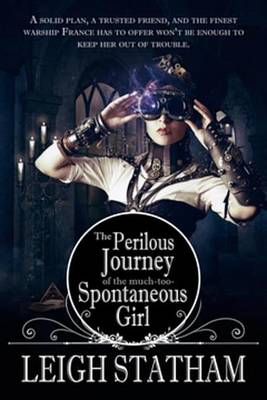
layawaydragon
Written on Sep 10, 2016
Okay, all of this happened after the gorgeous cover caught me, but still, it counts.
What I didn’t count on was it being a sequel in a series. Oops. I ran out of time to read the first book and review it, so I read this first as a standalone. But that may have worked out for the best…
The Good
+easy fun read
+hooked me from the get-go
+liked all the characters
+perspectives were spot-on
+loved the character growth
+didn't see the surprises coming
The Bad & The Other
-Halfway through Marguerite almost lost me with her antics
- Iroquois men seen as exotic man candy, which is problematic and not called out like the classism is.
Right away, I was pulled into the story. It was easy on the eyes and flowed beautifully. There’s plenty of refresher information so I didn’t feel like I missed anything. It was quite comfortable just jumping in. My luck paid off and the good feeling lasted.
Marguerite and Outil, the automaton, were a blast. Marguerite’s voice was spot on with her airs and perspective. She really is too spontaneous. I was cursing her stupid actions from the beginning, but wasn’t put off; I was cheering for her to get it right. It was only after numerous occasions of the same kind of stunts and her persistent privilege that it finally got to me.
I was about to say fuck this, but she turned it around right after. And I mean RIGHT AFTER I was tired of her antics. Then the threads came together, and she stepped up. I loved how she was authentically flawed from this standpoint at first and thankfully she progressed so it didn’t become a liability. It can be right but irritating to read and the line in the sand was drawn in the right spot.
Besides are troublesome heroine and her voice of reason, Jacques the love interest plays the biggest role. They have a push-pull flirty courting-but-not relationship. Marguerite is all about her independence, while Jacques is the “protecting you for your own good” gentleman.
I was on Marguerite’s side at first and then became frustrated how she kept sabotaging herself. She became a liability to where I had to admit the fools had a point about her. That’s, again, when she stepped up. I was so relieved! Then ~stuff~ was revealed that I didn’t see coming because I was wrapped up in her narrative. Now I’m like “Well, you both learned your lesson. You’ll be better next time. I look forward to it.”
There’s one other thing to mention though…Minor Spoilers Below:
Marguerite grows from her elitist views of other airwomen and lower class women in general. Which is fantastic. Really. (Though she doesn’t spare the same thought for lower-class men.) And I was quite pleased how she was corrected in regards to the Iroquois and legitimately changed.
“I am Iroquois, and my people are native to this land, but we are not native in the way you suggest.” His voice was proud and sharp.
She stopped calling them “natives” very quickly. What also happened was being attracted to the man like *that*. It was all animal lust tied into how different he was. She had to remind herself OF Jacques. It’s hard to pinpoint, but all their interactions felt…improper.
She wondered what her father, or any of the upper classes of France, would say if she walked into a ball with Otetiani on her arm. My, but he was handsome.
She started with the sheltered perspective of what white academics thought of the “natives” in books, and grew a tiny bit. And swooned. But they remained curiosities and fantasies to her using stereotypes of men of color. Which made me uncomfortable to say the least.
Plus, given I though Iroquois were matrilineal I was rather disappointed we only saw the men and that the men weren’t different living in a society like that. I mean, why flirt with the white girl that would have nothing in your society so you’d have nothing too? How would that even work? Would the women decide to accept her in or shun them both? Why is it automatically assume he’d move with her to her society and not the other way around?
Hmmmm….
